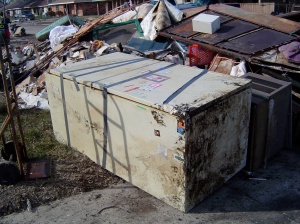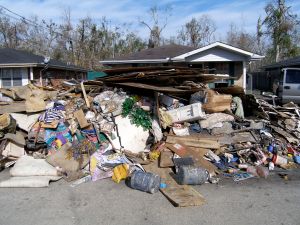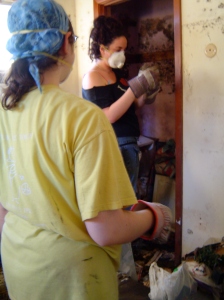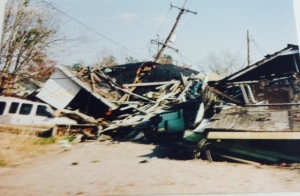What is the worst thing you’ve ever smelled? OK, I’ll go first.
I remember exactly where I was when I smelled the worst smell of my entire life.
January, 2006. St. Bernard Parish, Louisiana.
The stench is burned so deeply into my sinus cavities, that even thinking about that day now triggers a visceral response, bringing me back to that day nearly 10 years ago.
The fridge had been knocked over and it stood at an angle now, supported only by the kitchen cabinets that had broken loose from their molding during the flood. We duct taped the fridge tightly to try to prevent this most horrific assault on our sinuses and everyone stopped what they were doing to help haul it to the curb with the rest of the garbage. But the tile in the kitchen was slick with mud and sewage and the fridge tilted forward on the dolly.
And then, the door burst open.
The smell immediately punctured the air like an atomic stink bomb of death before the contents could even spill out, sending hurricane waters, broken glass and maggots across the kitchen floor.
The smell was a potpourri of rotten fruit, sour milk and spoiled meats that had been submerged and sealed shut in moldy, contaminated flood water for several months in the refrigerator.

The fridge in question had once belonged to a man named Eugene. The knitting room where I had been working moments before the fridge burst open had belonged to his wife.
Eugene and his family lived in St.Bernard Parish for years before Hurricane Katrina had destroyed their home, the water rising 10 feet in the first 15 minutes of the storm. When it seemed like Eugene and his family would certainly drown in their own home, a real life miracle arrived: The locked shed in their yard burst open and his small boat broke free and floated towards their window.
He loaded his family, including his father who was in a wheelchair, into the small boat and they were able to steer the boat to safety until they could be rescued.
Like most people, I was glued to my TV during Hurricane Katrina and the nightmare of days and weeks that followed, a mix of sadness, frustration, despair and anger. When my brother told me about a volunteer trip to work in New Orleans during his Spring Break with a Jewish student group (he was in college at the time, I was a “Professional Barista” in L.A.), I cashed in two free plane tickets and we embarked on one of the most Alternative Spring Breaks, ever.
We arrived in New Orleans on New Years Eve. Although the hurricane had hit nearly 4 months prior, the city was still a clusterfuck of uprooted trees, bent power lines, non-functioning traffic lights and the National Guard patrolling the streets in Humvees with rifles.
Many people had still not returned to their homes since Hurricane Katrina and some probably never would. On the ride from the airport, I stared out the window at the sea of abandoned vehicles that stretched along the underpass for miles. We passed drug stores and Dairy Queens with big, desperate signs that said “Hiring Immediately, $20/hr”, an hourly wage that reflected both the desire to draw people back to rebuild New Orleans and the ghost town that their city had become.

“All of this was underwater”, a local resident told us, gesturing all around where we stood and reaching towards the murky black line approximately 10 feet high on the side of his house. Houses had been spray-painted by the National Guard indicating the date they were checked and how many bodies they had retrieved. I remembered a post-apocalyptic story I had read when I was younger, The Girl Who Owned A City. It was like that, only it was real. And it was scary.
Now I stood in what remained of Eugene’s home with 10 other volunteers in a mess of mud and mold and over-turned furniture and broken glass. His home was completely destroyed.
I had been working in the room adjacent to the kitchen ripping up carpet and bagging up sludgy strings of yarn moments before the smell from the refrigerator (followed by the screams) seemed to pierce through the protective mask I was wearing and sent me and the rest of the volunteers running from the house.
We stood in the front yard squealing and retching and laughing, stunned by what just happened and that the smell we just encountered was, in fact, a real possible smell that existed.
We had begun working early that morning hauling every item out of the house and dragging it to the curb. Eugene approached me as I was bagging up his wife’s porcelain doll collection into garbage bags. He took one from my muddy glove and asked us to save them for her. But after watching us haul out dolls who had become unrecognizable with moldy faces and stringy hair, like we were rescuing them from a swamp, he said just forget it. Just throw it away.
I showed him old family photos that seemed like they could have been saved. Just throw it away, he said, barely looking at the pictures we had lined up along his lawn. I held them out to him, thinking maybe he didn’t realize what I was holding-black and white photos of his parents or maybe even his grandparents. Just throw it away, he said again. Throw it all away, he said, watching as strangers politely carried his possessions to his lawn and placed them in enormous heaps of garbage.
He paused for a moment. I figured he had changed his mind and realized that he did want to save some of his pictures.
“If you come across a snow globe with a picture of a boy, please set it aside. It’s very important to me.”
An hour had gone by before Eugene came out to us and said he was leaving. I told him that we were keeping an eye out for his snow globe. He shook his head disappointed.
“If you didn’t find it in the living room, it probably floated away. That’s where I used to keep it.”
“Why is the snow globe so important to you?” I asked, wondering how a snow globe could be more important to this man than old family photos that couldn’t be replaced.
“Because it has my son’s ashes in it.”
In that moment, I thought of that cliche question “If there was a fire in your house in the middle of the night and you could only grab one thing, what would you save?” I’ve probably answered it myself as an ice-breaker at summer camp or as part of some team-building exercise, the answers perhaps offering some insight into what I value in my life. Eugene didn’t have time to pack a bag of old journals or letters from his grandparents or autographed memorabilia. As his house filled with water and the winds ripped off doors and shattered his windows, he only had time to save what was truly important to him–his family.
They lost all of their possessions, but the only thing he wanted was something that represented his baby boy.
I assured him, based on absolutely nothing but my youthful optimism, that we would find his snow globe.
We worked for hours, hauling out furniture and belongings and ripping up moldy carpet from the living room of the house. We sledgehammered out windows and doors. We stripped his house down to the frame. We removed the Fridge of Death.

We removed family photos, couches, wedding albums, porcelain dolls, sports memorabilia, bundles of yarn, clothes, muddy carpet, beautiful crosses, broken dishes, old Playboy magazines and an impressive collection of guns.
There was no electricity in the town where we were, so we worked racing against the sun. We had cleared out every room of the house and still hadn’t found Eugene’s snow globe. We were tired and hungry and smelled like actual shit.
We were working in the last bedroom in the back of the house. I was shoveling clothes and mud from the closet and passing it to the girl behind me who then loaded the sludge into a wheel barrow. A mouse darted out of the closet and we hardly flinched. This shoveling went on uninterrupted like this for a while until she froze for a moment, holding what looked like a wad of mud in her hand.
“Is this… a snow globe?” she asked, trying to wipe the mud off the globe.

She passed it to me and I wiped the sludge on my shirt to reveal a picture of a young boy’s face in a snow globe. We cried and cheered and passed the snow globe around the room for all to see. We called to the guys who were working in the room next to us and they ran into the stripped down bedroom and cheered with us.
As the sun was setting, Eugene returned to see the contents of his home in heaps on his lawn. He looked around hazily at the piles of furniture and clothes and pictures. We presented him with his son’s ashes and he held the snow globe close to his chest.
We loaded into our van, feeling exhausted from the hours of manual labor, yet still high on emotions. We drove away from Eugene’s home, now just a structural frame stripped bare. He stood on his lawn, surrounded by mountains of his family’s life before Hurricane Katrina and held his son’s ashes in his hands.



Such a touching and vivid account of such a nightmarish event! Your descriptions make me feel like I am right there with you.
Love, Mom
Fantastic writing!
You do a magnificent job of describing your time in New Orleans by blending humor and real feeling into your story. The story of the man and the snow globe is funny, sad and touching all at the same time.
I hope you’ll write more about your experience in New Orleans. You have a very unique perspective into one of the great tragedies that impacted our country. Thanks for enlightening me!